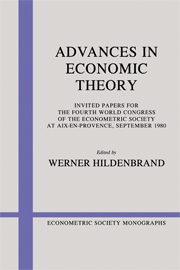Book contents
- Frontmatter
- Part I Economics of incentives
- Part II Information and the market mechanism
- Part III Non-Walrasian economics
- Part IV Repeated games
- Part V Topics in competitive analysis
- Part VI Applied macroeconomics
- Chapter 9 Macroeconomic tradeoffs in an international economy with rational expectations
- Part VI Industrial organization
Chapter 9 - Macroeconomic tradeoffs in an international economy with rational expectations
from Part VI - Applied macroeconomics
Published online by Cambridge University Press: 05 January 2013
- Frontmatter
- Part I Economics of incentives
- Part II Information and the market mechanism
- Part III Non-Walrasian economics
- Part IV Repeated games
- Part V Topics in competitive analysis
- Part VI Applied macroeconomics
- Chapter 9 Macroeconomic tradeoffs in an international economy with rational expectations
- Part VI Industrial organization
Summary
The purpose of this chapter is to study the macroeconomic policy tradeoff between output and price stability confronting individual countries in an international economy linked by trade flows and a managed exchange-rate system. A tradeoff between output and price stability arises because of the tendency for wage and price decisions to be staggered over time. This prevents general price and wage levels in each country from adjusting quickly to changes in nominal variables - such as the money supply or the exchange rate - and creates an effect of these variables on real output and trade flows. Within each country, however, these real effects are tempered by expectations of future aggregate demand policy, both at home and abroad, and by exchange-rate policies generally. In this chapter we use the rational expectations approach to describe these expectations effects.
The policy implications of staggered wage setting and rational expectations have been studied in a closed-economy context by Taylor (1980a) and in a small open-economy context by Dornbusch (1980, Ch. 9). This chapter represents a multicountry extension of these earlier studies. Its main aim is the development of an applied econometric framework for evaluating aggregate demand policies and exchange-rate rules under rational expectations.
Within a multicountry framework, it is possible in principle to determine an optimal set of policy rules for the world economy, given a social welfare function that depends on the macroeconomic goals of price and output stability in each country. The specific form of the optimal policy rules will of course be conditioned on parameters that need to be estimated empirically. Under certain conditions, the optimal rules will entail an exchange-rate regime in which each country makes its own decision regarding monetary accommodations although at the same time maintaining external stability. That is, each country chooses a point on its domestic tradeoff between output and price stability according to its own preferences and economic structure and independently of the preferences and economic structures abroad. But under other conditions, some coordination of aggregate demand policies is needed, for it is difficult to achieve isolation of each country from the preferences and economic structure of others.
- Type
- Chapter
- Information
- Advances in Economic Theory , pp. 235 - 252Publisher: Cambridge University PressPrint publication year: 1983



